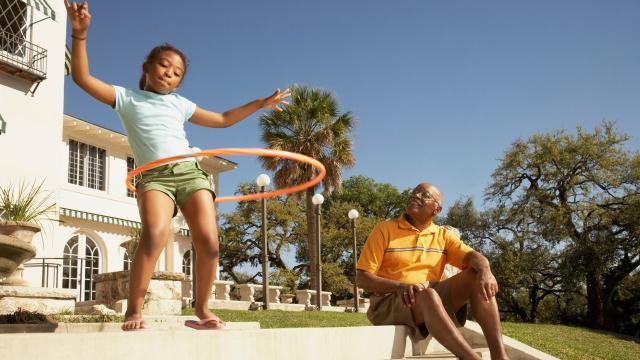How we feel about our bodies – and how we treat them – is influenced by many different factors, but one of the biggest is how we were raised. As a longtime fat activist, I have heard tons of stories about well-meaning parents who’d talk about food choices in terms of weight loss rather than nutrition, or exercise as a moral imperative rather than a fun way to spend time. And their children grew up to develop harmful attitudes and behaviours because of it.
It’s tough – we want to raise our kids to be body positive, to accept and live comfortably in the bodies they have. But a lot of us have our own insecurities and hangups to deal with. The good news is that you do not need to have “mastered” body positivity yourself to raise kids who are generally happy with their bodies. No one loves their body 100 per cent of the time, and that should not be your goal – for yourself or your child. The goal is a good relationship with food, exercise and bodies. That’s it.
To help your kids develop this, you might need to change your views and the language you use to talk about bodies. Here’s how to start.
Deal With Your Own Crap
As adults who have grown up in a fatphobic world which continues to treat fatness as a character flaw, we may not have the best relationships with our bodies. Your own baggage comes out in full force when you are parenting, whether it’s food or gender or TV. Once again, there is no perfect way to be in your body and even the most ardent fat activist has bad days in which they struggle (I know because I am one). However, if you have an eating disorder or your hatred of your body seriously gets in the way of your life, you should seek counseling to deal with this.
Even if you have an ok relationship with your body, it doesn’t hurt to try to work on your own body positivity. Kids will do what you do much more than what you say, so if you continue to hate your body, they are more likely to hate theirs. Remember, genetics play a huge role in bodies, so if your children carry your genes, their bodies may be similar to yours, which makes any criticism of your own body even more hurtful.
Talk With Your Kids About Bodies
If you want to raise generous kids, be generous. If you want to raise kids who don’t hate their bodies, show them how you love yours. The hard part is figuring out how to have these conversations.
[referenced url=”https://www.lifehacker.com.au/2017/08/teach-girls-to-think-about-what-their-bodies-do-instead-of-how-they-look/” thumb=”https://i.kinja-img.com/gawker-media/image/upload/t_ku-large/cli8zstsk2gzhl0wnido.jpg” title=”Teach Girls To Think About What Their Bodies Do Instead Of How They Look ” excerpt=”You’re not just imagining it. Girls are starting to think about their ideal body at an earlier age. In her book Beauty Sick. How the Cultural Obsession with Appearance Hurts Girls and Women, psychology researcher Renee Engeln cites the infuriating data.”]
With my toddler, I talk about how people have all different kinds of bodies – big bodies, small bodies, bodies that use wheelchairs, bodies that have brown skin and bodies that have wrinkles. With the older kids, we talk about bodies as well, but with more nuance and detail, such as how people with darker skin are targeted by the police more, or how the bodies on TV look one way while the bodies in real life look a different way. I have found this framework helpful in launching discussions about all sorts of issues, and I believe that for kids to truly be body positive, we need to address bodies in terms of race, disability, gender and age.
A great time to talk about and notice bodies is while watching TV. Make an effort for your child to see lots of different types of bodies doing different things. Talk about whose bodies are missing and what messages advertisers are trying to give us.
Get Comfortable With the Word “Fat”
The message that society gives is that it is ok to talk about some aspects of bodies, but not others. For example, it’s ok to say someone is tall, but not to say that someone is fat. While it may not be conscious, kids absorb this and this contributes to the message that there is something wrong with being fat. Practice saying it if you need to an reminder that fat is a neutral descriptor, just like tall or short or brunette or blonde.
[referenced url=”https://www.lifehacker.com.au/2018/01/give-kids-specific-language-to-talk-about-pleasure/” thumb=”https://i.kinja-img.com/gawker-media/image/upload/t_ku-large/gyqfkrrzvz1myglmiwb6.jpg” title=”Give Kids Specific Language To Talk About Pleasure” excerpt=”My five-year-old daughter enjoys premeditated tickles. She braces herself and says, ‘Go!’”]
Shift Your Views Around Food and Exercise
I could write a book about this, but I will keep it simple. At the end of the day, it’s not the food, it’s the attitudes around the food. Don’t make food a battleground. Of course, that doesn’t mean kids can eat whatever they want all the time. It means that food should be a way to connect and enjoy things that taste good while relaxing together. Sometimes that’s Brussels sprouts and sometimes that’s cookies. The key is taking a fat/calorie-neutral approach. For example, explaining that tonight we will be having Brussels sprouts because our bodies need the iron, as opposed to “I’m trying to lose weight so we’re eating Brussels sprouts.” Similarly, exercise should be done for the pleasure of moving your body and other weight-neutral reasons like gaining strength or endurance.
Feed your kids. Give them options, but don’t kill yourself. Talk about bodies and celebrate differences. Finally, remember that a peaceful relationship with your body is a much more crucial part of health than absolutely perfect nutrition or abs of steel. Your kids look to you for these messages so the more work you do on yourself, the easier it will be for your kids to internalize body positivity.

Comments